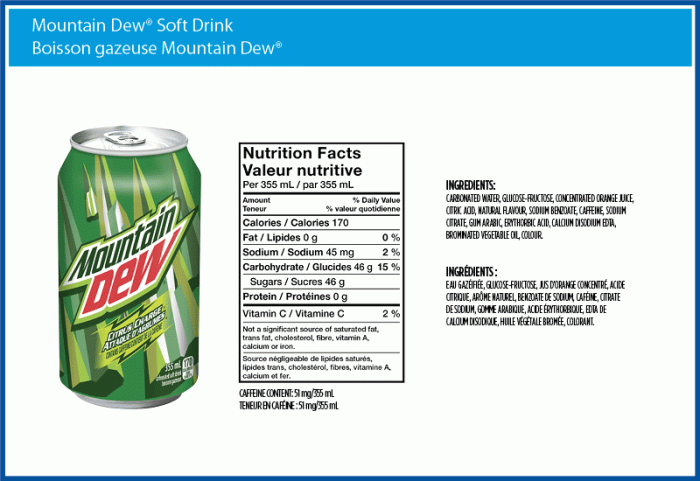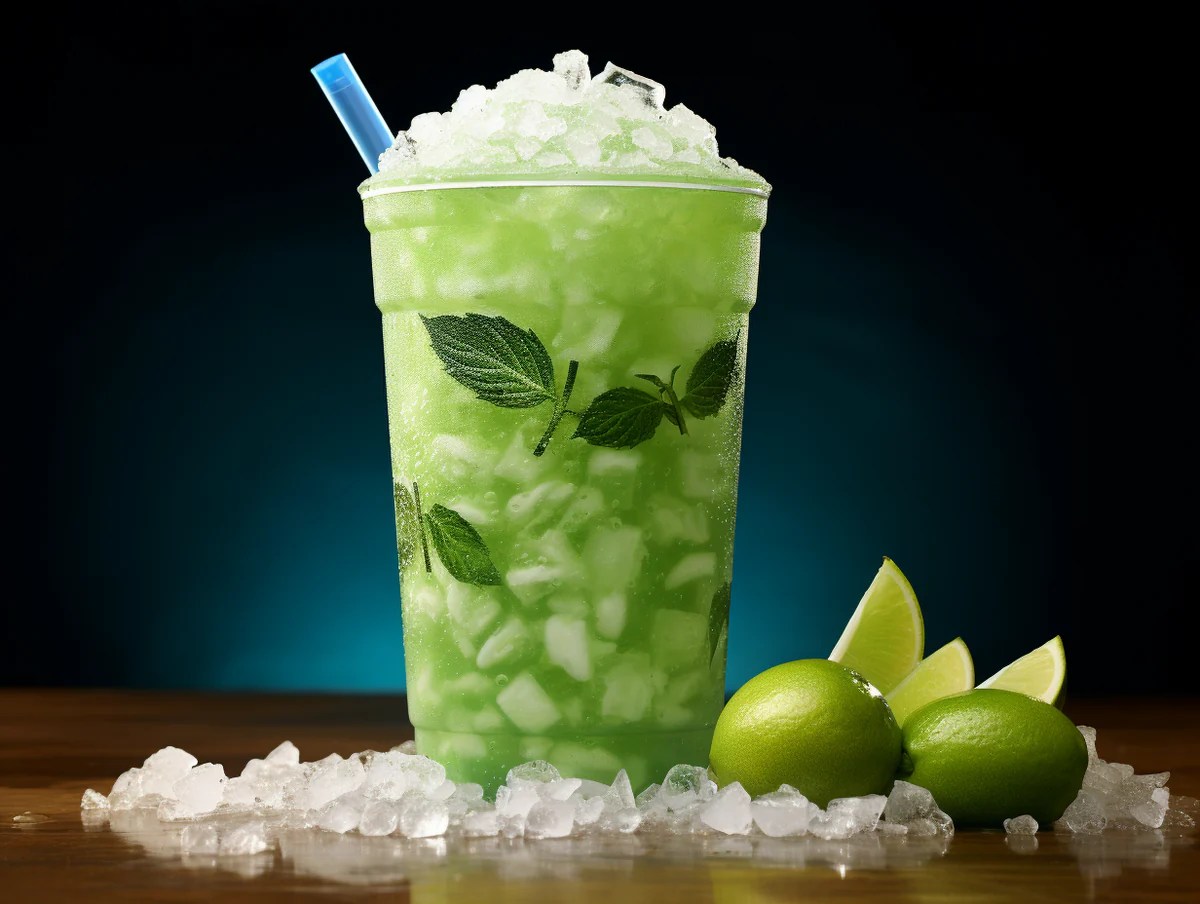Comparison with Other Beverages
Mtn dew nutrition facts – Let’s face it, Mountain Dew isn’t exactly known for its health halo. But how does its nutritional profile stack up against other popular drinks? We’re about to dive into a sugary, caffeinated deep end to find out. Prepare for a fizzy fact-finding mission!
Okay, so you’re checking out Mtn Dew nutrition facts, right? Totally get it, sometimes you need that sugary kick. But hey, for a healthier balance, maybe consider swapping that out sometimes for something like whole grain. You could check out the rye bread nutrition facts for a different perspective; then get back to those Mtn Dew facts – knowing your options is always a vibe, right?
Comparing Mountain Dew to other beverages reveals a fascinating (and slightly alarming) picture of sugar and caffeine content. While Mountain Dew boasts a unique flavor profile, its nutritional composition often stands out – not always in a good way. We’ll be examining its relative strengths and weaknesses against common alternatives.
Nutritional Comparison of Beverages, Mtn dew nutrition facts
| Beverage | Calories (per 12 oz serving) | Sugar (grams) | Caffeine (mg) |
|---|---|---|---|
| Mountain Dew | 170 | 46 | 54 |
| Coca-Cola | 140 | 39 | 34 |
| Pepsi | 150 | 41 | 37 |
| Orange Juice (100%) | 112 | 21 | 0 |
| Apple Juice (100%) | 110 | 25 | 0 |
Note: Nutritional values can vary slightly depending on the specific product and serving size. These figures represent approximate averages.
Sugar Content Comparison
Imagine a bar chart. Mountain Dew’s sugar bar would be significantly taller than those representing Coca-Cola and Pepsi, towering over the relatively shorter bars for orange and apple juice. This visual representation dramatically highlights the substantially higher sugar content in Mountain Dew compared to its soda counterparts and even 100% fruit juices, despite the latter often getting a bad rap for their sweetness.
Advantages and Disadvantages of Mountain Dew Compared to Alternatives
Mountain Dew’s primary advantage? That undeniably unique, intensely citrusy flavor that some people adore. The high caffeine content can provide a temporary energy boost for those who need a kick. However, the disadvantages are equally prominent: the extremely high sugar content contributes to empty calories and potential health concerns, including weight gain and dental problems. Compared to fruit juices, it lacks any nutritional value beyond the caffeine and provides significantly more sugar.
While other sodas have similar caffeine and sugar levels (though generally lower), they lack Mountain Dew’s distinct and polarizing taste.
Health Implications

Let’s be honest, Mountain Dew isn’t exactly known for its health halo. While it might temporarily quench your thirst and give you a sugar rush that could power a small city, regular consumption comes with some, shall we say,interesting* side effects. Think of it as a delicious, fizzy gamble with your long-term well-being.The high sugar content in Mountain Dew is a major player in the potential health risks.
We’re talking about a serious sugar bomb here, folks. This can contribute to weight gain, especially when combined with a less-than-stellar diet. And we’re not talking about gaining a pound or two – we’re talking about potentially packing on the pounds in a way that could make your favorite pair of jeans feel a bit snug. Beyond weight gain, the excessive sugar can also wreak havoc on your teeth, increasing your risk of cavities and gum disease.
Imagine needing a dental crown that looks suspiciously like a tiny, gleaming Mountain Dew can. Not a good look. Furthermore, studies have linked high sugar consumption to an increased risk of type 2 diabetes, heart disease, and other chronic illnesses. So, while that bright green liquid might taste like a party in your mouth, your body might be throwing a less-than-enthusiastic after-party.
Effects of Caffeine in Mountain Dew
Mountain Dew’s caffeine content isn’t just a mild pick-me-up; it’s a caffeine kick in the pants (a very sugary, fizzy pants). While a moderate amount of caffeine can provide a temporary boost in energy and alertness, excessive consumption can lead to anxiety, insomnia, and even heart palpitations. Imagine your heart doing the jitterbug – not exactly a relaxing experience.
Furthermore, caffeine can interact negatively with certain medications and health conditions, so it’s always a good idea to consult your doctor if you have concerns. Think of caffeine as a double-edged sword: a helpful tool in moderation, but potentially harmful if overused.
Recommendations for Moderate Consumption of Sugary Drinks
Let’s face it: completely cutting out sugary drinks cold turkey can feel like losing a beloved friend. However, moderation is key. Instead of making Mountain Dew your go-to beverage, consider limiting your intake to occasional treats. Think of it as a special reward, not a daily necessity. Water, unsweetened tea, and other healthier alternatives can be delicious and refreshing substitutes.
Small changes, like switching to a smaller can or diluting your Mountain Dew with water, can also make a significant difference over time. Remember, balance is the name of the game. Enjoy your Mountain Dew responsibly, and remember that moderation is the key to avoiding any potential health pitfalls.
Serving Size and Consumption Patterns: Mtn Dew Nutrition Facts

Let’s talk about Mountain Dew serving sizes – because let’s face it, one serving isn’t exactly a “serving” in the way most people experience it. We’re venturing into the land of “suggested” versus “reality,” where the suggested serving size is often dwarfed by the actual consumption habits of, shall we say, – enthusiasts*.The recommended serving size of Mountain Dew is typically one 12-ounce can or bottle.
Exceeding this recommendation, however, can lead to a sugar overload that would make a hummingbird jealous. We’re talking potential consequences like a sugar crash so epic it could rival the plot of a Michael Bay movie, not to mention potential long-term health implications we’ve already discussed. Think of it like this: one serving is a polite sip; multiple servings is a full-blown sugar tsunami.
Sugar Intake from Different Serving Sizes
The following table illustrates the sheer amount of sugar you’re consuming with varying Mountain Dew quantities. Remember, these are estimates and can vary slightly based on the specific Mountain Dew product.
| Serving Size (oz) | Approximate Sugar Grams | Approximate Sugar Teaspoons |
|---|---|---|
| 12 | 46 | 11.5 |
| 24 | 92 | 23 |
| 36 (that’s a LOT of Dew) | 138 | 34.5 |
A Week in the Life of a Mountain Dew Enthusiast (Scenario)
Let’s paint a picture: Meet Barry. Barry loves Mountain Dew. Barry drinks four 12-ounce cans of Mountain Dew every single day. Over the course of a week, Barry consumes 28 cans, or 336 ounces, of Mountain Dew. That’s roughly equivalent to the volume of a small bathtub filled with sugary goodness (or, depending on your perspective, sugary doom).
The total sugar intake for Barry over that week? A staggering 1288 grams, or approximately 322 teaspoons of sugar. That’s enough sugar to induce a sugar coma worthy of a legend. Barry, if you’re reading this, please consider switching to sparkling water. Your teeth will thank you.
Top FAQs
Is Mountain Dew suitable for diabetics?
Due to its high sugar content, Mountain Dew is generally not recommended for individuals with diabetes. Consult your doctor or a registered dietitian for personalized advice.
How much caffeine is in a can of Mountain Dew?
The caffeine content varies slightly depending on the flavor and serving size, but generally ranges between 54-55mg per 12oz can.
Are there any diet versions of Mountain Dew?
Yes, there are diet versions of Mountain Dew, typically sweetened with artificial sweeteners. However, these still contain other ingredients to consider.
Does Mountain Dew contribute to tooth decay?
Yes, the high sugar and acidity in Mountain Dew can contribute to tooth decay. It’s recommended to limit consumption and rinse your mouth with water after drinking it.
